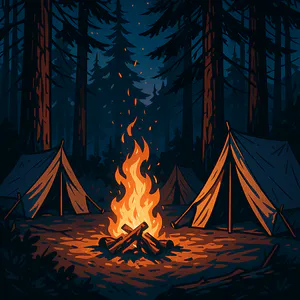Generate camp names
More Place Name Generators- <% result.name %>
Discover all Story Shack apps
Ignite Your Camp's Spirit
Creating the perfect camp name can set the tone for unforgettable adventures. Use these thought-provoking questions to inspire a name that captures the essence of your camp's mission and spirit.
- What natural features or landmarks surround your camp that can inspire a name?
- What unique activities or themes will your camp focus on that could influence the name?
- What emotions or values do you want the camp name to evoke in campers and staff?
- Are there any historical or cultural references relevant to your camp's location?
- What whimsical or fun elements could you incorporate to create a memorable name?
Frequently Asked Questions
Here are some common questions about the Camp Name Generator and how it can help you find the perfect name for your camp.
How does the Camp Name Generator work?
It generates a variety of camp names by combining elements from nature, activities, and themes, offering fresh ideas with each click.
Can I specify the type of camp name I want?
Currently, you can't specify; however, you can keep generating until you find a name that resonates with your vision.
Are the camp names unique?
The names are randomly generated, so with unlimited clicks, you'll discover a diverse array of options, though some may be similar.
How many camp names can I generate?
You can generate an unlimited number of camp names; simply click 'Generate' as many times as you like.
How do I save my favorite camp names?
You can copy a camp name instantly by clicking on it, or use the heart icon to save it for later reference.
What are good camp names?
There's thousands of random camp names in this generator. Here are some samples to start:
- Bumblebee
- Winnebago
- Bumblebee
- Indian Acres for Boys
- Point X
- Guidance
- Northway
- Sunny Days
- Wild Horse
- Carnage
About the creator
All idea generators and writing tools on The Story Shack are carefully crafted by storyteller and developer Martin Hooijmans. During the day I work on tech solutions. In my free hours I love diving into stories, be it reading, writing, gaming, roleplaying, you name it, I probably enjoy it. The Story Shack is my way of giving back to the global storytelling community. It's a huge creative outlet where I love bringing my ideas to life. Thanks for coming by, and if you enjoyed this tool, make sure you check out a few more!



















































